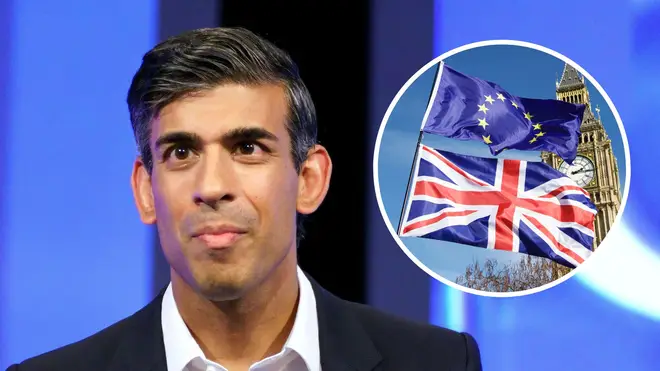[ad_1]
Sunak pledges to review 2,400 transferred EU laws before next election
Rishi Sunak is touting on social media a piece he has written for the Sunday Telegraph, promising: “If I am elected, by the time of the next election, I will have scrapped or reformed all of the EU law, red tape and bureaucracy that is still on our statute book and slowing economic growth.”
The paper describes Sunak as “brandishing his Brexiteer credentials”. Edward Malnick writes:
The former chancellor pledged that he will have “scrapped or reformed all of the EU law, red tape and bureaucracy that is still on our statute book and slowing economic growth” by the time of the next election if he succeeds Boris Johnson as prime minister.
Sunak said he would task a Brexit minister and a new Brexit Delivery Department with reviewing all 2,400 EU laws transferred over to the UK statute book after the UK’s exit from the bloc. He would demand the first set of recommendations as to whether each law should be scrapped or reformed “within my first 100 days in the job”.
Specific pledges included overhauling retained EU regulations “to trigger a Big Bang 2.0” for the City, with his team saying he would set a target “to make London once again the world’s leading financial centre by 2027”.
He also said he would replace the EU-derived GDPR data laws with “the most dynamic data protection regime in the world” and cut red tape slowing down clinical trials.
- This post was amended on 17 July 2022 to remove a reference to Sunak supporting remain in 2016. He supported leave.
Key events:
Rees-Mogg says Sunak promise on repealing EU law is ‘surprising’
Brexit opportunities minister Jacob Rees-Mogg has just described as “surprising” the pledge of Rishi Sunak to review all 2,400 EU laws transferred over to the UK statute book before the next election [see 12.28pm].
Rees-Mogg has tweeted:
This is a surprising promise as the Treasury under his leadership was insisting that taxation was exempt from the removal of EU law.
This is a surprising promise as the Treasury under his leadership was insisting that taxation was exempt from the removal of EU law. https://t.co/DON7zn9mPB
— Jacob Rees-Mogg (@Jacob_Rees_Mogg) July 17, 2022
That would appear to confirm the reporting of Bloomberg earlier [see 16.17] who claimed to have seen documents from late June when the Treasury, then under Sunak’s leadership, was saying it should be in charge of any review of EU legislation, and that the Rees-Mogg timetable of sunsetting it by 2026 was too ambitious.
These are the actual head-to-head numbers in that ConservativeHome polling, which hasn’t given a margin of error figure. They show Liz Truss and Rishi Sunak picking up support among their panel as Penny Mordaunt struggles to retain it
@ConHome Members Run-Off Poll:
Mordaunt Vs Sunak:
Sunak: 43% (+2)
Mordaunt: 41% (-17)Sunak Vs Truss:
Truss: 49% (-2)
Sunak: 42% (+8)Mordaunt Vs Truss:
Truss: 48% (+15)
Mordaunt: 41% (-10)Changes w/ last Monday.
— Election Maps UK (@ElectionMapsUK) July 17, 2022
The first quick takes on those figures from the ConservativeHome website are that they indicate the race is potentially fast-moving and very volatile. Here is pollster Matt Singh.
Volatile. You’d expect that from an unstratified sample, but I think we now have plenty of evidence that the reality genuinely can change quickly… https://t.co/xGDQ1ii7xf
— Matt Singh (@MattSingh_) July 17, 2022
It could, of course, be that the methodology or sample is all over the place.
It will surely be a bit more reliable than a Lord Ashcroft poll of random people who click buttons on Twitter though, which for some reason Harborough MP Neil O’Brien is getting excited about.
Speaking of ConservativeHome, it has published its latest head-to-head run-off poll ratings, and the headline is “Both Rishi Sunak and Liz Truss would defeat Penny Mordaunt in the membership ballot were it held today” – with the important caveat “if our survey is correct”.
Paul Goodman goes on to write in the piece:
Truss is the overall winner – beating both Mordaunt and Sunak. The case Team Badenoch will be making to Conservative MPs this weekend, drawing on our result yesterday that found her the most popular candidate, will be: “Truss is finished – vote for Kemi.” To which Team Truss, pointing to this latest result, will be able to counter: “Liz can beat all comers in the final – hang on in there.”
Anecdotes are not data, but Orpington MP Gareth Bacon has just published what he says was a straw poll of Conservative members in his constituency who are overwhelmingly backing Kemi Badenoch.
Bacon goes on to say on Twitter: “She’s fearless, has a fresh perspective, and would lead a tightly focused government that gets the big stuff right. She deserves to be one of the final two candidates for members to decide.”
I was delighted to talk to a packed Orpington Conservative Association meeting about the leadership election and hear their views on the candidates.
We took a straw poll, and members overwhelmingly backed @KemiBadenoch to lead our party and country. @BackingBadenoch 1/2 pic.twitter.com/ZUukYfTY2a
— Gareth Bacon MP (@GarethBaconMP) July 17, 2022
It does chime with the panel survey on the ConservativeHome website published yesterday, which handed Badenoch a double-digit lead.
Bloomberg has published a piece this afternoon casting doubt on Rishi Sunak’s ability to deliver on his promise today to review or repeal all transferred EU law on the statute books by the time of the next election. The Bloomberg article claims:
Documents seen by Bloomberg show that a senior Treasury official working for Sunak when he was still Chancellor of the Exchequer privately demanded that EU-derived tax laws be exempted from legislation to scrap so-called retained EU law, or REUL.
Lucy Frazer, the financial secretary to the Treasury, said in a letter that it was not feasible to simply rip up EU laws that had been integral to British tax policy and case law for four decades. She argued that the Treasury should take charge of more carefully repealing the laws during future finance bills to prevent the government from becoming mired in litigation. She also suggested it would not be possible to sunset retained EU law by 2026.
Brexit opportunities minister Jacob Rees-Mogg had written to colleagues on 1 June proposing that all of the REUL be sunset by 2026. Sunak appears to be bringing that date forward in today’s pledge, despite his own officials having cautioned against even aiming for 2026.
Read more here: Bloomberg – Sunak’s promise on EU law defies advice of his treasury team
During her media appearance on Times Radio this morning, attorney general Suella Braverman described Penny Mordaunt as “woke”, saying “My view of Penny is that she is woke, yes. I have no disrespect to her for her woke views, but I think we should call it out for what it is.”
Bury South Labour MP Christian Wakeford has tweeted in response, saying “The term woke essentially means someone who is concerned about social issues that may not necessarily affect them, largely centred on race and gender.”
“When,” he asks, “as a people did we become so unkind and unwilling to listen to others?”
The term woke essentially means someone who is concerned about social issues that may not necessarily affect them, largely centred on race and gender.
When as a people did we become so unkind and unwilling to listen to others? https://t.co/7rQBn0kk3X
— Christian Wakeford MP (@Christian4BuryS) July 17, 2022

Diane Taylor
The Home Office has been accused of misrepresenting the UN refugee agency’s stance on sending asylum seekers to Rwanda, in a new disagreement between the two organisations, the Guardian has learned.
The Home Office and UNHCR have clashed previously over the safety and suitability of the Home Office’s policy of forcibly removing some asylum seekers who have recently arrived in the UK on small boats or in the back of lorries to Rwanda to have their claims processed there.
A high court hearing on 10 June was told that Home Office misled refugees about UN involvement in Rwanda plans.
But despite UNHCR making its position on the government’s Rwanda scheme clear during the court hearing, the Home Office is continuing to state UNHCR is supportive of the controversial scheme.
A Home Office spokesperson said: “Our own assessment of Rwanda has found it is a fundamentally safe and secure country with a track record of supporting asylum seekers, including working with the UN Refugee Agency, which said the country has a safe and protective environment for refugees.”
A UNHCR UK spokesperson told the Guardian: “UNHCR holds serious concerns with regard to specific shortcomings of the Rwandan asylum system and Rwanda’s capacity to offer long-term solutions for those being removed under the proposed deal.”
Read more of Diane Taylor’s report here: Home Office in fresh row with UNHCR over Rwanda asylum policy
Patrick Wintour, the Guardian’s diplomatic editor, raises an interesting question about Tom Tugendhat’s suggestion that energy prices can be brought down “if we can put Putin on the back foot, if we can liberate those gas fields that he has been dominating”.
“How is Tugendhat planning to liberate the gas fields Russia is dominating?” my colleague asks. “Is he planning to invade Siberia?”

John Harris
John Harris writes for us today, arguing that what is missing from the Conservative leadership contest is a Tory candidate with the faintest idea of what modern Britain is actually like:
A huge amount of energy has been expended on talk of tax cuts, and a debate only about whether they should come sooner – or, as per the view of Rishi Sunak, later. There is across-the-board backing – even from Tom Tugendhat, the supposed representative of a more compassionate Conservatism – for sending refugees to Rwanda, surely the single most monstrous Tory policy of the past 12 years. Amid baking temperatures, there has been almost no serious discussion of the climate emergency. To the delight of her backers in the rightwing media, Kemi Badenoch, the only serious contender who has appeared to offer anything radical, seems to want post-Thatcher Toryism to be taken to its logical conclusion, whereby government does no more than the “essentials”; although the politicians in charge of it must also guard against anything in the culture deemed “unsound” (remarkably, one of her chosen targets is Ben & Jerry’s ice-cream, as if she speaks for an imaginary constituency of diehards who walk past the freezer cabinets in Waitrose and spit feathers).
In response to any suggestions that fundamental change is needed, any staunch Tory would presumably cite their party’s winning of an 80-seat majority in the Commons. But its aura of strength is partly down to an equally weak and confused Labour party – and in any case, the Conservatives are now faced with an unarguable and increasingly uncomfortable set of political facts. If Badenoch, Suella Braverman and that zealous Brexit convert Liz Truss often sound like politicians frantically trying to change the country before it is too late, it may be because somewhere in their political subconscious, they well know that their time is running out.
Read more here: John Harris – Wanted: a Tory candidate with the faintest idea of what modern Britain is actually like
The Economist has updated its odds tracker for the Conservative leadership race, with Rishi Sunak sneaking back in front of Penny Mordaunt as the politician people think will most likely be the next prime minister. The graph isn’t based on polling data of the people who will actually make the decision, it is showing a % chance of becoming next Conservative leader implied from Betfair Exchange.
Most importantly, as head of data journalism at the Economist, Alex Selby-Boothroyd, points out, it is making a pleasing infinity symbol for those of you, who like me, enjoy seeing patterns in things that probably aren’t there.

Rob Davies
Loot boxes in video games will not be banned in the UK, despite a government consultation finding evidence of a “consistent” association between the features and problem gambling.
Loot boxes have attracted comparison with gambling because they allow players to spend money to unlock in-game rewards, such as special characters, weapons or outfits, without knowing what they will get.
The features, popular in games such as Call of Duty and the Fifa football series, were effectively banned in Belgium in 2018, but the culture minister, Nadine Dorries, said the UK would not follow suit.
Instead, after a 22-month consultation, she said the government would discuss tougher “industry-led” protections with the UK’s £7bn gaming sector, drawing allegations from one expert that “foxes are guarding the hen house”.
Legislating to impose curbs or a prohibition on loot boxes as part of an expected overhaul of the UK’s gambling laws could have “unintended consequences”, Dorries said.
“For example, legislation to introduce an outright ban on children purchasing loot boxes could have the unintended effect of more children using adult accounts, and thus having more limited parental oversight of their play and spending,” the government said, in a response to the consultation published in the early hours of Sunday morning.
The government also concluded that while there was “a stable and consistent” association between loot boxes and problem gambling – identified across 15 peer reviewed studies – it could not be sure that there was a causative link.
While the Department for Digital, Culture, Media and Sport (DCMS) stopped short of proposing legislation, Dorries said: “Children and young people should not be able to purchase loot boxes without parental approval. In addition, all players should have access to spending controls and transparent information to support their gaming.”
Read more of Rob Davies’ report here: UK will not ban video games loot boxes despite problem gambling findings
Stephen Bush has just published a piece at the FT in which he argues that Rishi Sunak needs to up his game in tonight’s debate – not because he wasn’t good on Friday, but because he is struggling to convince the party membership that he is for them. Bush says:
The former chancellor’s performance in Friday’s debate was brilliant. He was clear, concise and demonstrated exactly what his supporters see in him. But he doesn’t have enough support to win: every survey suggests he will lose to whoever faces him in the final round. His biggest problem, I think, is that he is seen as a tax-raising moderate by members.
Sunak’s strategy has all too often resembled that of Ken Clarke: telling Conservative members that, yes, they may disagree with him, but he is their best chance of winning an election. That tactic ended in failure for Clarke in 1997, 2001 and 2005 and there is no reason to believe it will work better for Sunak.
Bush also identified what he sees at the core of the struggle for the support of the right of the party between Kemi Badenoch and Liz Truss, writing:
Badenoch’s hopes rest on appearing to be a more straight-talking and articulate alternative for the party’s right than Truss, and it helps that she is free and able to criticise the departing government.
Truss needs to retain the support of Boris Johnson’s remaining allies in the media and the parliamentary party if she is to remain in pole position to unite the Conservative right. On TV, she managed to stick to that position by staying loyal to Johnson. Her reward is the continued loyalty and support of much of the rightwing press, but it comes at a cost because the departing prime minister is now incredibly unpopular.
You can read more here: FT – Stephen Bush – In the second debate, it’s Rishi Sunak who needs to change gear
Dr Philippa Whitford, the SNP’s health spokesperson in Westminster, appears to have laughed off the suggestion coming out of Scottish Conservative MP John Lamont and Penny Mordaunt’s campaign that Mordaunt would be the candidate that the SNP fear winning the most.
[ad_2]
Source link














